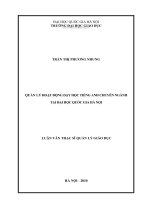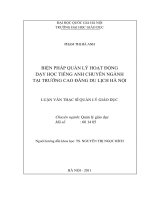tiếng anh thuyết trình (tiếng anh chuyên ngành tài chính)
Bạn đang xem bản rút gọn của tài liệu. Xem và tải ngay bản đầy đủ của tài liệu tại đây (479.35 KB, 24 trang )
Group 5
Members: Lê Anh Dũng
Lương Duy Linh
Trần Quốc Hoàn
Phạm Minh Quân
New words
•
•
•
•
Marketing (n) [ˈmɑːrkɪtɪŋ]: All activities a company conducts in order to acquire
and retain customers or clients.
Marketer (n) /ˈmɑːrkɪtər/: Company or person who works in marketing – công ty
; người hoạt động trong lĩnh vực marketing
Anticipate(v) /ænˈtɪsɪpeɪt/: To foresee and act in advance of- liệu trước, lường
trước
Satisfy (v) /ˈsætɪsfaɪ/: To fulfil the the desires or needs of (a person)- làm hài
lòng
•
•
•
•
•
target customer / target consumer /ˈtɑːrɡɪt ˈkʌstəmər/ (n): It is people or group of
people who are targeted to buy a certain product - khách hàng mục tiêu
market condition (n): /ˈmɑːrkɪt kənˈdɪʃn/ : The state/ situation in the market – điều
kiện thj trường
research (n) /ˈriːsɜːrtʃ/: study of sth- sự nghiên cứu
research (v) /ˈriːsɜːrtʃ/: study or examine – nghiên cứu
wants (n) /wɑːnt/: something that you feel you need , or you really desire ,but not
having it doesn’t mean you die- nhu cầu
•
•
•
•
•
•
needs (n): /niːdz/ basic living essential i.e.if you don’t have it , you could die, needs are
the things which make ones satisfaction arise when attained. Needs can be natural or
man-made: nhu cầu thiết yếu
market segmentation /ˈmɑːrkɪt ˌseɡmenˈteɪʃn/ (n): phân đoạn thị trường
loyal customer /ˈlɔɪəl ˈkʌstəmər /(n): regular buyers of a company or a shop - khách
hàng thân thiết
Potential /pəˈtenʃl/ (adj): can be developed in the future- tiềm năng
marketing mix (n) /ˈmɑːrkɪtɪŋ /mɪks/ : set of different substances together in marketing
– tổ hợp marketing
sales promotion (n) /seɪlz prəˈmoʊʃn/ :xúc tiến thương mại
•
•
distribute (v) /ˈdɪstrɪbjuːt/: to supply (goods) to retailers- phân phối
•
guarantee (v) /ˌɡærənˈtiː/ :to assume responsibility for the quality or performance of
e.g.guarantee a product- bảo hành
•
•
distribution /ˌdɪstrɪˈbjuːʃn/ (n) : all activities that involve efficient movement of
finished products from the end of the production line to the consumer – sự phân
phối
Guarantee /ˌɡærənˈtiː/ (n) a promise or assurance, especially one given in writing,
that attest to the quality or durability of a product or service
brand name /brænd neɪm/ (n): a word , name, etc, used by a company to identify its
products or services distinctively –nhãn hiệu
The centrality of marketing
•
Most management and marketing writers now distinguish between selling and marketing
. The"selling concept" assumes that resisting consumers have to be persuaded by
vigorous hard-selling techniques to buy non-essential goods and services. Products are
sold rather than bought .The"marketing concept', on the contrary, assumes that the
producter's task is to find wants and fill them. In other words, you don't sell what you
make , you make what will be bought. As well as satisfying existing needs, marketers can
also anticipate and create new ones. The markets for I-phones, video games , personal
computers, and genetic engineering, to choose some recent examples, were largely
created rather than identified
•
Hầu hết các nhà nghiên cứu về marketing và nhà quản lý ngày nay đều phân
biệt giữa bán hàng và tiếp thị .” Khái niệm bán hàng” giả định rằng việc chống lại
người tiêu dùng phải được thuyết phục bởi các kĩ thuật bán hàng vô cùng ưu việt để
họ mua những hàng hóa và dịch vụ không thiết yếu. Những sản phẩm được bán
nhiều hơn trước. Trái lại khái niệm “marketing “ giả định rằng nhiệm vụ của các nhà
sản xuất là phải tìm ra được những mong muốn và thỏa mãn chúng. Nói cách khác ,
bạn không bán những gì bạn làm, mà bán những gì sẽ được mua. Cũng như việc thỏa
mãn những nhu cầu hiện tại , người bán cũng có thể đoán trước và tạo ra các sản
phẩm mới . Thị trường cho I-phone , trò chơi video , máy tính cá nhân,và công nghệ
gen , để lựa chọn mốt số ví dụ gần đây , được tạo ra một cách rộng rãi hơn so với đã
được xác định.
•
/
Marketers are consequently always looking for market opportunities -profitable
possibilities of filling unsatisfied needs of creating new ones in areas in which the
company is likely to enjoy a differential advantage, due to its distinctive competencies
(the things it does particularly well). Market opportunities are generally isolated by
market segmentation. Once a target market has been identified, a company has to
decide what goods or service to offer. This means that much of the work of marketing
has been done before the final product or service come into existence. It also means
that the marketing concept has to be understood throughout the company, e.g., in the
production department of a manufacturing company as much as in the marketing
department itself. The company must also take account of the existence of
competitors, who always have to be identified, monitored and defeated in the search
for loyal customers
•
Do đó người tiếp thị luôn luôn trông đợi các cơ hội thị trường - khả năng sinh lời từ việc đáp ứng nhu cầu chưa
được thỏa mãn của việc tạo ra các sản phẩm mởi các khu vực mà các công ty có thể tận hưởng một lợi thế khác
biệt, do năng lực đặc biệt của nó (những điều nó không đặc biệt nổi). Cơ hội thị trường nói chung đang bị cô lập bởi
phân khúc thị trường. Khi một thị trường mục tiêu đã được xác định, một công ty phải quyết định những hàng hóa
hoặc dịch vụ cung cấp. Điều này có nghĩa rằng có rất nhiều công việc của tiếp thị đã được thực hiện trước khi sản
phẩm hay dịch vụ chính thức được thành lập. Nó cũng có nghĩa là các khái niệm tiếp thị phải được hiểu trong toàn
công ty, ví dụ, trong bộ phận sản xuất của một công ty sản xuất cũng nhiều như trong các bộ phận tiếp thị của chính
doanh nghiệp đó. Doanh nghiệp cũng phải tính đến sự tồn tại của đối thủ cạnh tranh, những người luôn luôn phải
được xác định, theo dõi và đánh bại trong việc tìm kiếm các khách hàng trung thành.
*Question
•
•
•
•
•
•
/What does the term “market opportunities “ in the second paragraph
mean?
“market opportunities “ is profitable possibilities of filling unsatisfied needs of
creating new ones in areas in which the company is likely to enjoy a differential
advantage, due to its distinctive competencies (the things it does particularly
well).
2/Why should the production department should understand the marketing
concept?
Market opportunities are generally isolated by market segmentation. Once a
target market has been identified, a company has to decide what goods or service
to offer. This means that much of the work of marketing has been done before the
final product or service come into existence.
3/Why must the company consider the existence of competiors?
because they who always have to be identified, monitored and defeated in the
search for loyal customers
•
Rather than risk launching a product or service solely on the basis of intuition or
guesswork, most companies undertake market research (GB) or marketing
research (US). They collect and analyse information about the size of a potential
market, about representatives, who also talk to customers, are another
important source of information
•
Thay vì mạo hiểm giới thiệu 1 sản phẩm hoặc dịch vụ đơn lẻ dựa trên trực giác
hoặc sự phán đoán, hầu hết các doanh nghiệp đều thực hiện nghiên cứu thị
trường (GB) hoặc nghiên cứu marketing (US). Họ thu thập và phân tích thông tin
về quy mô thị trường tiềm năng, vềphản ứng của khách hàng đối với những
điểm đặc trưng của hàng hóa hoặc dịch vụ riêng biệt, v.v. Các nhân viên bán hàng
ngoài nói chuyện với khách hàng thì họcũng là nguồn cung cấp thông tin quan
trọng.
•
•
. Once the basis offer, e.g., a product concept, has been established, the company
has to think about the marketing mix, i.e. all the various elements of a marketing
program, their integration, and the amount of effort that a company can expend
on them in order to influence the target market. The best-known classification of
these elements is the “4Ps”: product, place, promotion and price. Aspects to be
considered in marketing products include quality, features (standard and
optional), style, brand name, size, packaging, services and guarantee. Place in a
marketing mix includes such factors as distribution channels, locations of points
of sale, transport, inventory size, etc.
Promotion groups together advertising, publicity, sales promotion and personal
selling, while price includes the basis list price, discounts, the length of the
payment period, possible credit terms, and so on. It is the job of a product
manager or a brand manager to look for ways to increase sales by changing the
marketing mix.
•
Khi 1 đề xuất cơ bản, ví dụ, khi khái niệm sản phẩm được đưa vào, doanh nghiệp
phải nghĩ về marketing hỗn hợp, tức là tất cả các yếu tố khác nhau của chương
trình marketing, sự hội nhập và mức độ nỗ lựcmà doanh nghiệp có thể dùng đến
để tác động đến thị trường mục tiêu. Cách phân loại nổi tiếng nhất về những yếu
tố này là “4Ps”: sản phẩm, vị trí, tiếp thị truyền thông và giá cả. Các khía cạnh
được xem xét trong các sản phẩm marketing bao gồm chất lượng, đặc điểm (tiêu
chuẩn và tùy chọn), kiểu mẫu, nhãn hiệu, kích cỡ, bao bì, bảo hành và các dịch vụ
kèm theo. Vị trí trong marketing hỗn hợp bao gồm nhiều yếu tố như các kênh
phân phối, các địa điểm bán hàng, vận chuyển, quy mô kho hàng, v.v. Tiếp thị
truyền thông gồm quảng cáo, quảng bá, sự xúc tiến bán hàng và bán hàng trực
tiếp, trong khi giá cả bao gồm giá cơ bản, sự giảm giá, độ dài của kỳ thanh toán,
các điều kiện tín dụng, v.v. Nhiệm vụ của giám đốc sản xuất hay quản lý thương
hiệu là tìm ra các cách tăng doanh số bằng cách thay đổi marketing hỗn hợp.
•
4. What are the elements of the marketing mix?
They are product, place, promotion and price.
•
5. What aspects are considered in marketing products?
Aspects to be considered in marketing products include quality, features (standard
and optional), style, brand name, size, packaging, services and guarantee.
•
6. What factors are included in promotion?
Promotion groups together advertising, publicity, sales promotion and personal
selling.
•
•
Other questions:
What factors are included in place?
Place in a marketing mix includes such factors as distribution channels, locations of
points of sale, transport, inventory size, etc.
•
What factors are included in price?
Price includes the basis list price, discounts, the length of the payment period,
possible credit terms, and so on
•
5. It must be remembered that quite apart from consumer markets (in which
people buy products for direct consumption) there exist enormous producer or
industrial markets, consisting of a the individuals and organizations that acquire
goods and services that are used in the production of other goods, or in the supply
of services to others. Few consumers realize that the producer market is actually
larger than consumer market, since it contains all the raw materials, manufactured
parts and components that go into consumer goods, plus capital equipment such
as buildings machines, supplies such as energy and pens and paper, and services
ranging from cleaning to management consulting, all of which have to be
marketed. There is consequently more industrial than consumer marketing, even
though ordinary consumers are seldom exposed to it
•
Cần phải nhớ rằng, ngoài những thị trường tiêu dùng ( nơi mà mọi người mua những
sản phẩm để tiêu dùng trực tiếp ), còn tồn tại những nhà sản xuất khổng lồ hoặc những
thị trường công nghiệp hoặc buôn bán, bao gồm tất cả những cá nhân và tổ chức mua
hàng hóa và dịch vụ để sản xuất những hàng hóa khác, hoặc cung ứng các dịch vụ đến
những đơn vị khác. Một vài người tiêu dùng nhận thấy rằng thị trường của những nhà
sản xuất thực chất lớn hơn thị trường của những người tiêu dùng, vì nó bao gồm tất cả
những nguyên liệu thô, những thành phần đã được sản xuất để trở thành hàng hóa tiêu
dùng, cộng thêm công cụ vốn ví dụ như những nhà xưởng, các nguồn cung cấp ví dụ
như năng lượng, bút, giấy, và các mảng dịch vụ từ lau dọn cho đến tư vấn quản trị, tất
cả những điều ấy phải được cung cấp. Do đó nên marketing công nghiệp nhiều hơn
marketing tiêu dùng, mặc dù những người tiêu dùng phổ thông ít khi tiếp xúc với hình
thức này.
Questions
•
7, Which is larger, consumer market or producer market ?
- Producer market.
Summary
•
•
The"selling concept" assumes that resisting consumers have to be persuaded by
vigorous hard-selling techniques to buy non-essential goods and services
The"marketing concept', on the contrary, assumes that the producter's task is to
find wants and fill them. In other words, you don't sell what you make , you
make what will be bought.
•
•
Marketers are consequently always looking for market opportunities
Once a target market has been identified, a company has to decide what goods or
service to offer.
•
most companies undertake market research (GB) or marketing
research (US).
•
•
the company has to think about the marketing mix,
The best-known classification of these elements is the “4Ps”: product, place,
promotion and price
•
Promotion groups together advertising, publicity, sales promotion and personal
selling
•
•
•
there exist enormous producer or industrial markets
the producer market is actually larger than consumer market,
ordinary consumers are seldom exposed to industrial marketing
Thanks for listening









